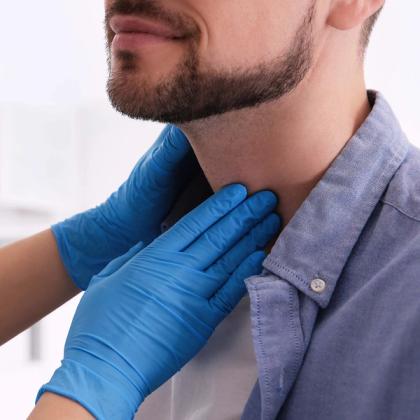This podcast episode is worth 0.31 CPD credits. Upgrade to Pro
Hypothyroidism, or an underactive thyroid gland, is increasingly common as people get older, but it may often be undiagnosed or diagnosed late due to the insidious nature of some of its symptoms. These include fatigue, weight gain, sensitivity to cold, constipation, dry skin, hair loss and depression. Common causes of hypothyroidism include autoimmune diseases, thyroid surgery, radiation therapy, certain medications and iodine deficiency, which is the leading cause globally. Treatment typically involves hormone replacement therapy, and with proper treatment and monitoring most people with hypothyroidism can lead normal, healthy lives. In this episode, Dr Roger Henderson provides an overview of hypothyroidism and considers differential diagnoses, testing, referral criteria, thyroxine replacement principles and prognosis.
Key references
- Rasvi S, et al. Thyroid. 2019;29(2):174-182. doi: 10.1089/thy.2018.0251.
- Garg A, Vanderpump MPJ. Br Med Bull. 2013:107:101-116. doi: 10.1093/bmb/ldt024.
- Garber JR, et al. Endocr Pract. 2012;18(6):988-1028. doi: 10.4158/EP12280.GL.
- Chaker L, et al. Lancet. 2017;390(10101):1550-1562. doi: 10.1016/S0140-6736(17)30703-1.
- NICE. https://cks.nice.org.uk/topics/hypothyroidism/diagnosis/assessment/.
- NICE. https://cks.nice.org.uk/topics/hypothyroidism/diagnosis/differential-diagnosis/.
- NICE. https://cks.nice.org.uk/topics/hypothyroidism/prescribing-information/levothyroxine/.
- Thayakaran R, et al. BMJ. 2019;366:l4892. doi: 10.1136/bmj.l4892.
Key take-home points
- The prevalence of treated hypothyroidism in the UK is believed to be almost 3 million.
- It is 10 times more common in women than men.
- Subclinical hypothyroidism is found in up to 10% of the population.
- The most common cause globally is iodine deficiency, but this is rare in the UK, where the usual causes are increasing age and autoimmune factors.
- Multiple conditions can present similarly to hypothyroidism. Additionally, there are non-thyroid conditions that may affect thyroid function test results.
- Typical symptoms are linked to slowing down of metabolism, such as constipation, fatigue, weight gain, dry skin and cognitive impairment.
- When examining a patient for suspected hypothyroidism, always check for the presence of a goitre.
- A thyroid-stimulating hormone (TSH) test is the most sensitive and specific primary-care blood test when diagnosing hypothyroidism. If the TSH is below the reference range, measure the free T4 and T3 in the same sample.
- If specialist referral is not required, treat primary hypothyroidism with levothyroxine monotherapy. Remind the patient that clinical improvement may take some time to occur after starting treatment, or after altering the dose.
- Spontaneous remission of hypothyroidism without treatment is uncommon.
- Treating hypothyroid patients to achieve normal thyroid limits long-term appears to achieve no difference in the pattern of long-term health outcomes for those patients.
Create an account to add page annotations
Annotations allow you to add information to this page that would be handy to have on hand during a consultation. E.g. a website or number. This information will always show when you visit this page.
